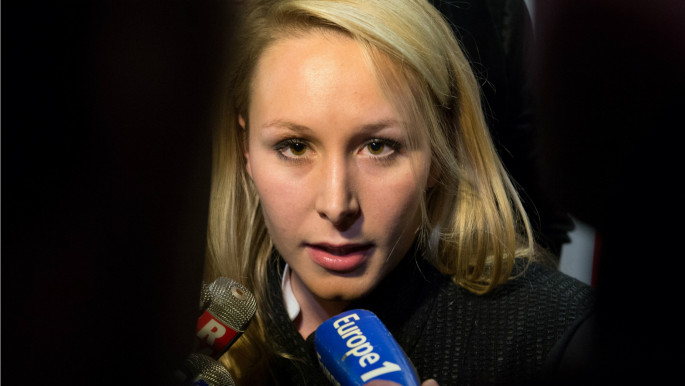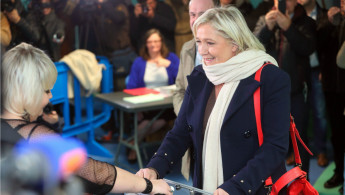France's extreme-right scores historic win in post-attacks vote
France's far-right National Front ran strongly in a first-round regional vote that was the first election since an attack by Islamic extremists left 130 dead in Paris.
3 min read
FN leader Marine Le Pen took more than 40 percent of the vote [Getty]
France's far-right National Front saw record-high results in regional polls on Sunday, held under a state of emergency just three weeks after Islamic extremists killed 130 people in Paris.
The National Front (FN) came first with between 27.2 and 30.8 percent of the vote nationwide, and found itself topping the list in at least six of 13 regions, according to early estimates.
FN leader Marine Le Pen and her 25-year-old niece Marion Marechal-Le Pen broke the 40-percent mark in their respective regions, shattering previous records for the party after tapping into voter anger over a stagnant economy and security fears linked to Europe's refugee crisis.
Marine Le Pen, a lawyer by training, welcomed the "magnificent result", saying it proved the FN was "without contest the first party of France".
A grouping of right-wing parties took between 27 and 27.4 percent, the estimates showed, while the ruling Socialist party and its allies took 22.7-23.5 percent.
The polls were held under tight security following the country's worst-ever terror attacks, which have thrust the FN's anti-immigration and often Islamophobic message to the fore.
Around half the 45 million registered voters took part in the polls, which will see the top two parties in each region go to a run-off next Sunday.
The early estimates showed 47-year-old Marine Le Pen taking a whopping 40.3-42.1 percent of the vote in the economically depressed northern region of Nord-Pas-de-Calais-Picardie, once a bastion of the left.
Marion Marechal-Le Pen did equally well in the vast southeastern Provence-Alpes-Cote d'Azur, known for its glamorous beaches and stunning countryside, on 41.2-41.9 percent.
"42 percent! Thank you!" she wrote on Twitter.
France's regions have recently been consolidated and given more power over areas such as schools, transport and support for local businesses.
Hollande's Socialists languish
President Francois Hollande, who cast his vote in Tulle in central France, has seen his personal ratings surge as a result of his hardline approach since the November 13 attacks in Paris.
But his Socialist Party has languished behind the FN and the centre-right Republicans led by former president Nicolas Sarkozy.
Speaking after the estimates, Sarkozy again refused to consider any tie-up with the Socialists in order to beat the FN in the second round on December 13.
"We must hear and understand the profound exasperation of the French people," said Sarkozy.
Victories next week would not only hand control of a regional government to the FN for the first time, but would also give Marine Le Pen a springboard for her presidential bid in 2017.
The electoral system has tended to keep the far-right from power, as mainstream voters gang up against the FN in second rounds.
But the party has been on a roll, taking first place in European and local polls over the past two years.
Ahead of the vote, Prime Minister Manuel Valls urged party activists to "appeal to patriotism" to ensure a massive turnout, while Le Pen accused him of waging "total war" against her.
In her campaign, she focused repeatedly on the migrant camp in Calais known as "The Jungle" where thousands of migrants and refugees are camped trying to reach Britain and northern Europe.
The FN - whose leaders have repeatedly linked immigration with terrorism - has been climbing in the polls since the gun and suicide bombing attacks in Paris.
When it emerged that at least two of the attackers had entered Europe posing as migrants, the FN went to town with a message of "we told you so."
The National Front (FN) came first with between 27.2 and 30.8 percent of the vote nationwide, and found itself topping the list in at least six of 13 regions, according to early estimates.
FN leader Marine Le Pen and her 25-year-old niece Marion Marechal-Le Pen broke the 40-percent mark in their respective regions, shattering previous records for the party after tapping into voter anger over a stagnant economy and security fears linked to Europe's refugee crisis.
Marine Le Pen, a lawyer by training, welcomed the "magnificent result", saying it proved the FN was "without contest the first party of France".
A grouping of right-wing parties took between 27 and 27.4 percent, the estimates showed, while the ruling Socialist party and its allies took 22.7-23.5 percent.
The polls were held under tight security following the country's worst-ever terror attacks, which have thrust the FN's anti-immigration and often Islamophobic message to the fore.
Around half the 45 million registered voters took part in the polls, which will see the top two parties in each region go to a run-off next Sunday.
The early estimates showed 47-year-old Marine Le Pen taking a whopping 40.3-42.1 percent of the vote in the economically depressed northern region of Nord-Pas-de-Calais-Picardie, once a bastion of the left.
 |
|
| Marion Marechal-Le Pen |
Marion Marechal-Le Pen did equally well in the vast southeastern Provence-Alpes-Cote d'Azur, known for its glamorous beaches and stunning countryside, on 41.2-41.9 percent.
"42 percent! Thank you!" she wrote on Twitter.
France's regions have recently been consolidated and given more power over areas such as schools, transport and support for local businesses.
Hollande's Socialists languish
President Francois Hollande, who cast his vote in Tulle in central France, has seen his personal ratings surge as a result of his hardline approach since the November 13 attacks in Paris.
But his Socialist Party has languished behind the FN and the centre-right Republicans led by former president Nicolas Sarkozy.
Speaking after the estimates, Sarkozy again refused to consider any tie-up with the Socialists in order to beat the FN in the second round on December 13.
"We must hear and understand the profound exasperation of the French people," said Sarkozy.
Victories next week would not only hand control of a regional government to the FN for the first time, but would also give Marine Le Pen a springboard for her presidential bid in 2017.
| We must hear and understand the profound exasperation of the French people - Former French President Nicolas Sarkozy |
The electoral system has tended to keep the far-right from power, as mainstream voters gang up against the FN in second rounds.
But the party has been on a roll, taking first place in European and local polls over the past two years.
Ahead of the vote, Prime Minister Manuel Valls urged party activists to "appeal to patriotism" to ensure a massive turnout, while Le Pen accused him of waging "total war" against her.
In her campaign, she focused repeatedly on the migrant camp in Calais known as "The Jungle" where thousands of migrants and refugees are camped trying to reach Britain and northern Europe.
The FN - whose leaders have repeatedly linked immigration with terrorism - has been climbing in the polls since the gun and suicide bombing attacks in Paris.
When it emerged that at least two of the attackers had entered Europe posing as migrants, the FN went to town with a message of "we told you so."





 Follow the Middle East's top stories in English at The New Arab on Google News
Follow the Middle East's top stories in English at The New Arab on Google News
![The UAE is widely suspected of arming the RSF militia [Getty]](/sites/default/files/styles/image_330x185/public/2024-11/GettyImages-472529908.jpg?h=69f2b9d0&itok=Yauw3YTG)
![Netanyahu furiously denounced the ICC [Getty]](/sites/default/files/styles/image_330x185/public/2024-11/GettyImages-2169352575.jpg?h=199d8c1f&itok=-vRiruf5)
![Both Hamas and the Palestinian Authority welcomed the ICC arrest warrants [Getty]](/sites/default/files/styles/image_330x185/public/2024-11/GettyImages-2178351173.jpg?h=199d8c1f&itok=TV858iVg)